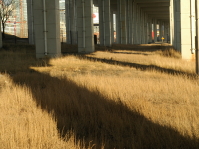Omar El Akkad is an Egyptian-Canadian journalist who has covered various terrorism-triggered conflicts around the world, as well as the treatment of prisoners at Guantanamo. He clearly brings that experience to his debut novel, a story about a hypothetical second US Civil War, occurring towards the end of the 21st century.
In this plausible future the coastal areas of the country have been ravaged by rising oceans (Florida is gone and the nation's capital has been moved to Columbus, Ohio) and attempts to curtail fossil fuel usage have triggered the secession of several of the southern states. States that bristle at any infringement on freedoms despite the disproportionate effects of climate change on their territories. Secession escalates to a twenty year civil war. Drone strikes are common and terrifying, and foreign governments attempt to influence the course of the war for geopolitical advantage.
The story follows Sarat, a girl from the south born into poverty, forced into refugee camps, and ultimately recruited into service in the fight against the north. The evolution and radicalization of her character is well detailed by the author. It's interesting but also deeply disturbing because her thoughts and views are believable and understandable.
Summarized, this all sounds like a too conveniently plotted turn-of-the-tables for the United States with regard to its historical foreign policies, but it actually flows well in the story. The events successfully remind one that the distance between the supposedly "civilized" western world and the war-torn countries of the Middle East and Africa is much smaller than we'd like to think.
The book is quite gripping but definitely not spirit-lifting. Given the current political climate it hits a little too close to home. But I guess that is what makes it so good.


